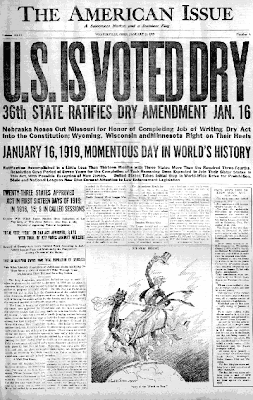Women's suffrage is another cause that dates back to the nineteenth century. After the Civil War, advocates saw the vote given to African-American men, but women had to wait until 1920 to receive suffrage. In the decades leading up to this constitutional amendment, many groups argued for the cause, and in 1890, the National Woman Suffrage Association and the American Woman Suffrage Association merged into the National American Woman Suffrage Association, which emerged as a powerful force behind women's suffrage. President Woodrow Wilson supported this movement in 1918, and Congress passed the amendment in 1919.
Divine, Robert A., T. H. Breen, George M. Fredrickson, and R. Hal Williams. America Past and Present. Revised Sixth Edition, AP* Edition . Addison-Wesley Educational Publishers Inc., 2003. 671-73. Print.
"Eighteenth Amendment", Ohio History Central, July 1, 2005, http://www.ohiohistorycentral.org/entry.php?rec=1493
Web. 3 Feb 2011. <https://blogger.googleusercontent.com/img/b/R29vZ2xl/AVvXsEgDgoaJC7f9WWqOoX9Jyva0Wvj0SSOtQRvkSiSnc40LX7j7c9zXaTWcEZiBm7koAGRp4jJnJdcwQWEnAtBtvhG_nLbCh9pF-Wo-7diXv6emYdj17U7PJhyZNMnGR3MoWUjFtUPU_KvCxuA/s1600/Prohibition.gif>.
Joint Resolution of Congress proposing a constitutional amendment extending the right of suffrage to women, May 19, 1919; Ratified Amendments, 1795-1992; General Records of the United States Government; Record Group 11; National Archives.
